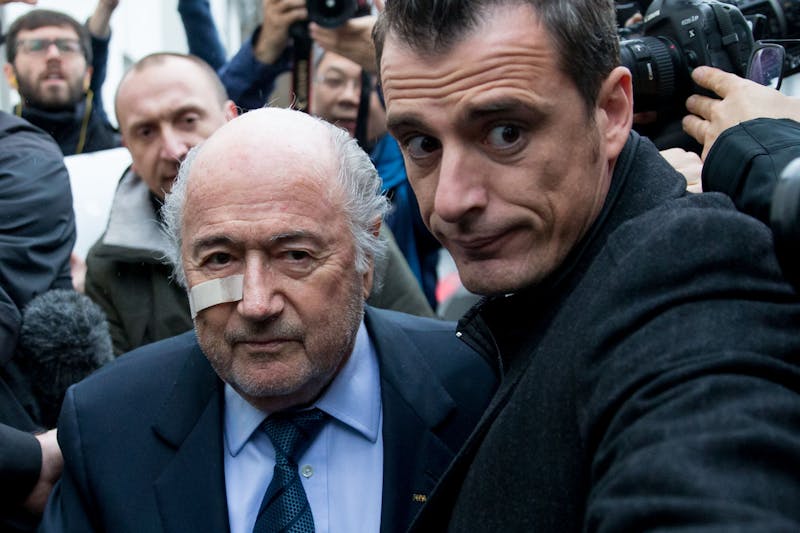
Has anyone had a worse year than Sepp Blatter? Ever since U.S. prosecutors kicked off a long-overdue investigation into corruption at FIFA in May, the noose has tightened around football’s most powerful man. But, just as it looked like he might end 2015 unscathed, this week Blatter was banned from the sport for eight years.
Blatter has never been one to take things lying down, and as things got worse for him his responses have increasingly become a study in self-delusion. After the ban came down on Monday. Blatter insisted he was still FIFA president, and that he would keep fighting—not just for himself but for the sake of the organization. “Suspended for what?” he asked. “The president can only be removed by the congress. Even suspended, I am still the president. I regret, but I am not ashamed.”
As we celebrate the news that FIFA might finally be cleaning up its act, we take a look back at Sepp Blatter’s annus horribilis.
May 26: FIFA officials arrested in Switzerland.
In the early hours ahead of FIFA’s annual meeting, Swiss authorities arrested 14 officials for extradition to the U.S. on charges that included racketeering, wire fraud, and a money-laundering conspiracy. The next day, Blatter offered up this defense: “I know many people hold me ultimately responsible for the actions and reputation of the global football community, whether it’s a decision for the hosting of a World Cup or a corruption scandal. We—or I—cannot monitor everyone all of the time.”
As John Oliver put it, “That is weak. You’re basically Charles Manson saying, ‘Listen, I’ve got a big family. I don’t know what Squeaky gets up to half the time.’”
May 29: Blatter is reelected.
Just three days after the arrests, Blatter secured his fifth term at FIFA’s helm for another four years. While promising reform—which he’d already done while campaigning for his previous term—he again distanced himself from the corruption investigation. “We can’t constantly supervise everyone in football,” he said. “You can’t just ask people to behave ethically just like that.”
In response to concerns about his age, the 79-year-old also took a moment to meditate on the concept of time. “What is this notion of time? Time is infinite and we slice it up,” he said. “I find the time I’ve spent at FIFA is very short and it will remain short.” He added, “The age is no problem. You have people that are 50 who look old.”
June 2: Blatter resigns, then backpedals.
Days after reelection, Blatter reversed course, and then changed his mind about the whole thing just a few weeks later—with a rather philosophical argument. “I did not resign. Only those who know the past can understand the present and shape the future,” he said. “Or in other words: the ball is round—but only those who come from outer space know the actual dimensions of our sport.” Whatever that means...
June 5: United Passions flops in U.S. theaters
Talk about bad timing. Perhaps the true barometer of Blatter’s delusions of grandeur came in the form of United Passions, a movie dramatizing he and his predecessors’ rise to power the Guardian called “pure cinematic excrement.” In the trailer, Blatter is described—unironically—as the one “good at finding money,” and the movie literally follows him as he secures lucrative sponsorship deals from behemoths like Adidas and Coca-Cola. The film made exactly $918 in the U.S. and is now officially the lowest-grossing film in U.S. film history.
July 20: Dollar bills rain down.
In what is surely the most iconic image of the FIFA scandal, British comedian Simon Brodkin interrupted Blatter’s press conference by throwing money at the FIFA president. Blatter was visibly disgruntled, calling for security and postponing the conference. “We have to clean here first,” he said, before walking off the podium.
October 8: Blatter and Michel Platini suspended.
It was the first suspension for both, but only for 90 days. Blatter is expected to face an independent FIFA ethics committee for further questioning about a $2 million payment he made to UEFA president Platini in 2011.
December 21: Blatter and Platini banned.
A week before the verdict, Blatter wrote a letter to FIFA’s 209 member associations protesting his innocence by invoking his parents. Among the values they taught him was: “Never accept any money which you have not earned, always pay off your debts.” He also compared the investigation to the Spanish Inquisition.
The day before the verdict, he reportedly told Swiss newspaper Blick that the commission has dropped the corruption charges against him. (He was still facing four other charges, but let’s focus on the important part, Sepp.)
Now, it’s finally over for Blatter. Having protested his innocence for months, he was unsurprisingly defiant. “I will fight,” he said. “I will fight for me and I will fight for FIFA. Suspended for what? ... Even suspended, I am still the president.”
Perhaps the most bizarre part of his quadrilingual, hour-long press conference—made even more bizarre by the “Nelly” bandaid he wore—was when Blatter invoked Nelson Mandela. “Mr. Mandela was talking about humanity. Humanity needs no other significance than to respect each other and I say that to celebrate humanity through football was created by this great humanist.”

